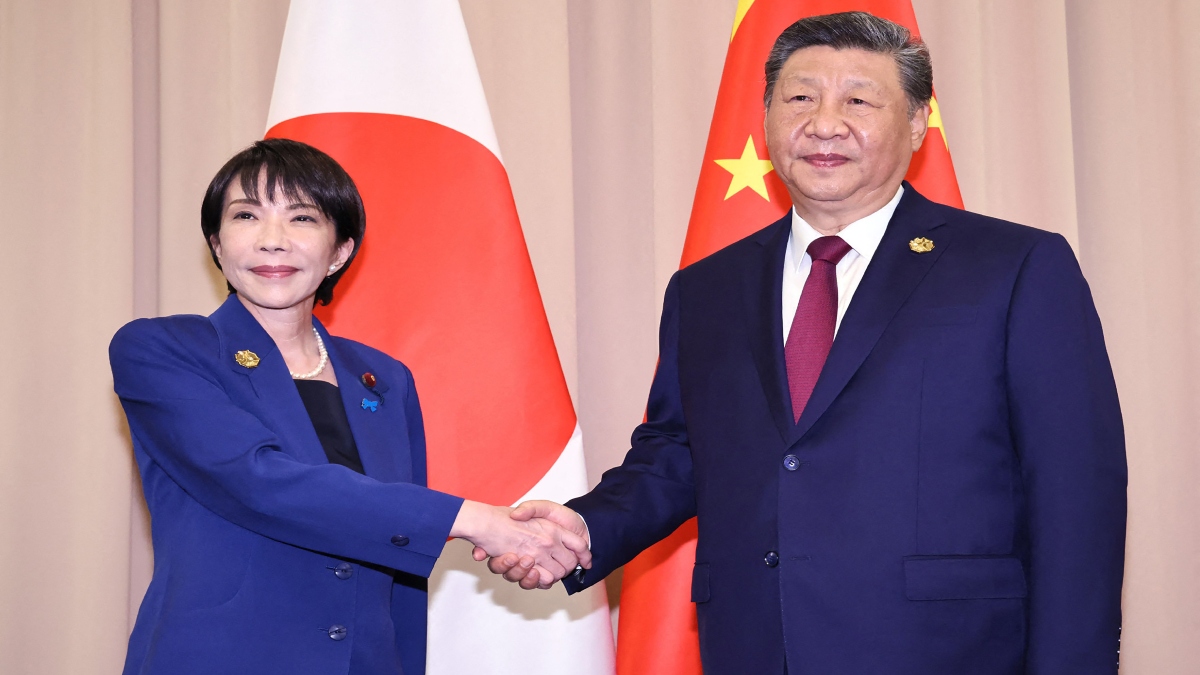Japan is undertaking a wide-ranging diplomatic push to calm tensions with China after Prime Minister Sanae Takaichi’s recent comments on Taiwan sparked a strong backlash from Beijing and raised concerns over potential strain on bilateral economic ties.
According to a Bloomberg report, Foreign Minister Toshimitsu Motegi told lawmakers on Tuesday that Tokyo is working on several channels to clarify Takaichi’s stance, including dispatching a senior diplomat to Beijing this week.
“Our stance is being conveyed clearly at various levels,” Bloomberg quoted Motegi as saying.
According to Japanese media, Masaaki Kanai, the director general of the Japanese foreign ministry’s Asia and Oceania bureau, was scheduled to meet his Chinese counterpart, Liu Jinsong, on Tuesday.
Kanai is expected to reassure Liu that Takaichi’s comments do not signal a shift in Japanese security policy, and to urge China to refrain from actions that could damage bilateral ties.
China accuses Japan of reviving wartime militarism
Takaichi provoked Beijing by becoming the first Japanese leader in decades to openly connect a potential Taiwan Strait crisis with the possible deployment of Japanese forces.
Her remarks triggered immediate economic reprisals from China, along with warnings of further retaliation. Beijing has demanded that Takaichi retract her statement.
The official newspaper of China’s ruling Communist Party said on Friday that Japan is trying to revive its wartime militarism and risks repeating the mistakes of history with Prime Minister Sanae Takaichi’s remarks on Taiwan.
Quick Reads
View AllChina’s top diplomat in Osaka posted a news article on X highlighting Takaichi’s Taiwan remarks and added the comment, “the dirty neck that sticks itself in must be cut off,” prompting Japan’s embassy in Beijing to file a protest with Chinese Vice Foreign Minister Sun Weidong.
Since then, Chinese state media have issued a stream of sharply worded editorials attacking Takaichi, drawing on long-standing grievances over Japan’s wartime history and Beijing’s acute sensitivity to any statements related to Taiwan.
Takaichi’s comments were far from an “isolated political rant,” the Communist Party–run People’s Daily said in a commentary.
‘Substantive retaliation’
Beijing has warned Chinese citizens against traveling to Japan, with state media saying China is preparing for “substantive retaliation.”
China is the biggest source of tourism to Japan, with Chinese travellers known for spending large sums on cosmetics, clothes and consumer electronics.
The call by Beijing for Chinese travellers to avoid Japan – which was followed by advice that students reconsider taking up places at Japanese universities – is already affecting businesses.
On Monday, the Chinese cinema releases of two Japanese animations were postponed indefinitely. State media suggested the delays were also part of China’s countermeasures.
Meanwhile, Motegi said Tokyo is closely tracking Beijing’s actions and will “take appropriate steps” if necessary.
Since the dispute erupted, armed Chinese coast guard vessels have entered waters controlled by Japan near the disputed, uninhabited islands claimed by both nations in the East China Sea.
Defence Minister Shinjiro Koizumi said Japan is monitoring regional military activity and stressed that Takaichi’s remarks do not represent a shift in Japan’s long-held policy on Taiwan.
Takaichi said this month that if military force were used in a Taiwan conflict, it could constitute a “survival-threatening situation” for Japan — a designation that could legally justify deploying its military to support friendly nations responding to the crisis.
Earlier Japanese leaders have typically avoided discussing such scenarios due to diplomatic sensitivities.
She has defended her comments, saying she presented hypothetical cases and emphasised that the government would make a comprehensive assessment before determining whether a situation meets the “survival-threatening” threshold.
“China made it unambiguously clear that Taiwan is a core interest. Japan had been cognizant of this position but Takaichi has contradicted long years of wise and careful views by giving a direct answer,” Bloomberg quoted Kazuhiko Togo, visiting professor at the University of Shizuoka, as saying.
With inputs from agencies
)